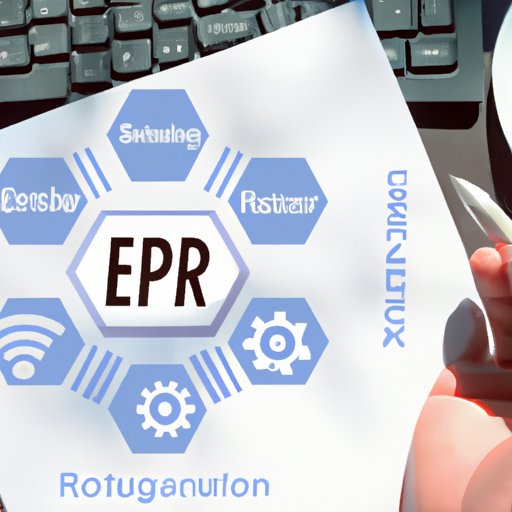
Introduction
ERP, short for Enterprise Resource Planning, is a term used to describe a software system that assists organizations in managing their business processes and resources efficiently. In today’s fast-paced world, businesses require real-time information and data insights to make informed decisions. This article will provide insights on what ERP stands for in business and explore its role in modern businesses, its evolution, benefits of ERP systems in business operations, the meaning of ERP systems and their applications, and ERP implementation strategies.
Unlocking the Definition of ERP: How it Impacts Modern Businesses
An ERP system is an integrated suite of software applications that enables businesses to share real-time information and data across multiple departments, including but not limited to finance, HR, sales, procurement, and supply chain management. This sharing of information streamlines business processes, reduces costs, increases efficiency, and improves decision-making processes, productivity, and customer satisfaction. In a nutshell, ERP systems provide a single source of truth, connecting all business functions. This means that everyone works with the same data, which ensures consistency, reliability, and accuracy.
The Evolution of ERP: Why it Matters to Your Business Today
ERP systems have come a long way since their inception in the 1960s, when they were used primarily to manage inventory in the manufacturing industry. Over the years, the software has evolved to include a range of modules that cater to various functions across the enterprise. Today, ERP systems are designed to meet the needs of various industries, including finance, healthcare, retail, and many more. The technology has also evolved, with more businesses adopting cloud-based ERP systems, which allow for easy accessibility, improved scalability, and greater flexibility.
Exploring the Benefits of ERP Systems in Business Operations
The benefits of ERP systems in business operations are numerous. One of the biggest benefits is improved efficiency. With an integrated system, businesses can automate many of their processes, reducing the need for manual work. This, in turn, leads to increased productivity and reduced errors. With ERP systems also come better data insights and analytics, which means businesses can make informed decisions that lead to greater profitability. Improved customer satisfaction is also a significant benefit of ERP systems, as businesses can quickly respond to customer requests and provide a more personalized experience. Some examples of businesses that have successfully implemented ERP systems include Amazon, Coca-Cola, BMW, and Johnson & Johnson.
A Beginner’s Guide to ERP: Understanding its Meaning and Applications
ERP systems are highly customizable, meaning businesses can tailor them to meet their unique requirements. The core functionality of an ERP system includes finance, supply chain, manufacturing, human resources, and customer relationship management. Each of these modules plays a vital role in the overall efficiency and productivity of the organization. For instance, finance modules automate financial operations, including accounting, billing, and reporting, while HR modules enable businesses to manage employee data, payroll, and benefits administration. ERP systems are widely used in various industries, including manufacturing, service, healthcare, and retail, as they help businesses streamline their operations and increase their profitability.
ERP Systems: Streamlining Business Processes to Boost Efficiency and Productivity
ERP systems serve to streamline business processes by breaking down organizational silos and providing real-time data insights across departments. This means that everyone has access to the same data, and there’s no duplication of effort. ERP systems help in managing inventory levels, production schedules, sales forecasting, and other critical business functions. By automating many of these processes, businesses can save time and money, reduce errors, and increase efficiency and productivity. Different types of ERP systems exist, including cloud-based and on-premises solutions, which can be customized to meet a business’s specific needs.
ERP Software in Business: Maximizing Your Resources for Increased Profits
ERP software enables businesses to maximize their resources and achieve better profits. With an integrated system, businesses can quickly track their inventory levels, sales performance, financial health, and other critical data points. This information facilitates strategic decision-making, enabling businesses to make informed choices for the future. ERP systems also help to optimize business processes and workflows. This means that businesses can operate more efficiently and effectively, reducing their costs and increasing their revenue streams.

ERP Implementation Strategies: Steps to a Smooth and Successful Integration
Implementing an ERP system requires careful planning and execution. Businesses must create an implementation plan, considering factors such as timelines, budgets, and resources. Finding the right vendor is also crucial, as they will determine the success or failure of the ERP implementation. It’s also essential to train employees and help them embrace the change, as this will ensure better adoption and usage of the system. Other tips for a successful integration include conducting thorough research, defining specific goals, and avoiding common pitfalls such as inadequate testing and poor communication.
Conclusion
In conclusion, ERP systems are an essential tool for modern businesses, enabling them to manage their resources, operations, and workflows efficiently and effectively. With a range of benefits, including improved efficiency, increased productivity, and better customer satisfaction, businesses that adopt ERP systems can quickly gain a competitive edge. This article has explored what ERP stands for in business, explained its evolution, benefits, and various applications, and provided a guide to implementation strategies. With careful planning and execution, businesses can successfully integrate ERP systems and reap the rewards they offer.





